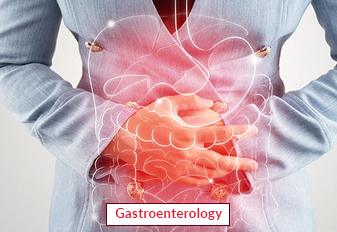Gastroenterology
Gastroenterology involves the diagnosis and treatment of illnesses affecting the esophagus, stomach, intestines, liver, pancreas, gallbladder, and other digestive organs. Gastroenterologists diagnose and treat gastrointestinal (GI) issues. A gastroenterologist is a medical expert who treats and diagnoses digestive system diseases including the liver, pancreas, stomach, small and large intestines, and gallbladder.
About
India provides outstanding and easily accessible gastrointestinal care. India is home to highly trained gastrointestinal surgeons and gastroenterologists who can diagnose and treat a wide range of digestive issues. A gastroenterologist should be contacted for the right treatment of gastrointestinal problems such as diverticulitis, stomach ulcers, irritable bowel syndrome, inflammatory bowel disease, Celiac disease, small intestine bacterial overgrowth, and others.

Some of the common gastrointestinal procedures are listed below:
- · Endoscopy: In order to inspect the digestive tract, a long, thin tube with a camera on its tip is put into the mouth or rectum. This is the process used to identify and manage issues like tumors, inflammation, and ulcers. To aid in their relaxation during the treatment, patients may be given sedative. Subsequently, the tube will be gradually introduced into the oesophagus, throat, and mouth. The camera will next be inserted into the stomach to provide images of any potential illnesses there.
- · Biopsy: This is a procedure in which the gastroenterologist takes a small tissue sample from the digestive tract and examines it under a microscope. This is done to diagnose cancer, peptic ulcers, hepatitis, endometriosis, and other infections.
- · Gastrointestinal Surgery: For conditions like gallbladder illness, colorectal cancer, tumors, gastroesophageal reflux disease, and even weight loss, this GI therapy method is used. Laparoscopic, open, and bariatric surgery are the most often performed surgical procedures (for weight loss and health enhancement). The degree of surgical invasiveness affects how long it takes to recuperate. Invasive surgical procedures may require longer recovery times.
- · Medications: Certain gastrointestinal problems may be managed with medication alone, without the requirement for surgeries or endoscopic procedures. Proton pump inhibitors, antacids, laxatives, and anti-diarrheal drugs are among the pharmaceuticals used to treat gastrointestinal diseases.
- · Alternative therapies: These are non-conventional treatments that might help manage GI symptoms. Some alternative therapies for GI disorders include acupuncture, herbal remedies (like ginger, peppermint, and other herbs to treat nausea, bloating, and indigestion), probiotics, and mind-body therapies (like cognitive-behavioural therapy).
